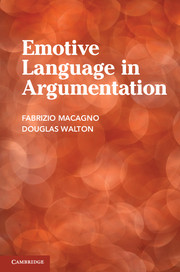Introduction
Published online by Cambridge University Press: 05 June 2014
Summary
Words are often used to describe reality, to refer to objects, and to communicate feelings, desires, and emotions. Words can be powerful. They can move us, they can frighten us, and they can lead us to action. Words have been described as tools and weapons, as signs and masks. Words have been described as instruments having the force of creating and changing reality. They have been investigated with regard to their semantic structures, their co-occurrences, and their syntactic combinations. Even so, we rarely realize that words can be arguments. In this book we show how they can be moves that guide us toward judgment or action and function as speech acts that allow certain replies and prevent others. In everyday communications we hardly consider that complex forms of reasoning lie under their uses, and that these forms of reasoning are interwoven with meaning presumptions and dialogical games. In our words we can conceal an implicit change of our interlocutor’s knowledge or a silent alteration of his system of values. These are powerful effects, but they typically go unnoticed.
When Chesterton claimed in one of his famous paradoxical quotes that “Impartiality is a pompous name for indifference, which is an elegant name for ignorance” (Chesterton, The Speaker, 15 December 1900), he did much more than simply describe impartiality. He condensed an attack on a commonly accepted and widely praised implication in a definition, an argument reversing the shared hierarchy of values. When politicians refuse to define ‘terrorism’ or ‘torture,’ or when they use words like ‘peace’ and ‘hostilities’ with new definitions, they cannot be accused of distorting reality or telling lies. They are simply performing a much more powerful action – changing the rules of the game of discourse. When science and knowledge are used “to provide long words to cover the errors of the rich” (Chesterton, Heretics, 88), they are employed to provide instruments for forcing the hearer to accept actions, thereby allowing the speaker to avoid commitment or justification of a kind that might normally be required. Words employed in this way are clever dialectical moves, implicit arguments that not only escape the normal burden to provide reasons for a conclusion, but at the same time lead the hearer to a value judgment or a decision and implicitly modify his possible reactions.
- Type
- Chapter
- Information
- Emotive Language in Argumentation , pp. 1 - 4Publisher: Cambridge University PressPrint publication year: 2014

